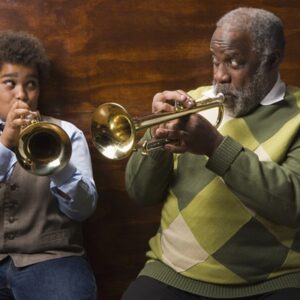Make Music a Part of Your Healthy Aging Plan
March 1, 2024 | Aging - general, Mental Health

Music has been described by both scholars and artists as the universal language of humanity. Music is therapeutic, especially when it comes to healthy aging. As research continues to unveil the relationship between music and our minds, it becomes increasingly evident that embracing musical moments is good for our health.
Music and brain health
Studies have consistently shown that engaging with music stimulates various regions of the brain, fostering neural connections and enhancing cognitive function. Research conducted by the University of California, Irvine, suggests that listening to music activates regions of the brain associated with autobiographical memory, helping us reminisce and reflect. Musical engagement has been linked to improved executive function, attention, and even language processing, providing a harmonious symphony of benefits for brains of all ages.
A recent joint study from the University of Michigan and AARP polled older adults about their music habits and overall health. People who said they listen to music or play instruments regularly had lower rates of loneliness and depression.
“Music is a universal language that has powerful potential to improve wellbeing,” said Sarah Lenz Lock of AARP. “AARP’s own research shows that music can play an important role in healthy aging by improving our moods, fostering social connections and, potentially, enriching our brain health.”
Music and physical well-being
Beyond its cognitive perks, music can influence our physical well-being, as well. Studies indicate that listening to music can lower blood pressure, reduce heart rate, and alleviate stress and anxiety. In fact, research published in the British Medical Journal revealed that individuals who listened to music experienced a significant reduction in systolic blood pressure (the upper number) compared to those who did not.
Music can also encourage movement and exercise, promoting mobility, coordination, and balance among older adults. From the graceful sway of ballroom dancing to the spirited rhythm of tai chi, integrating music into physical activities fosters a sense of joy and vitality, empowering individuals to embrace the full spectrum of their physical capabilities.
Music can be such a powerful tool for health that perhaps it should be added to the things we talk about with our doctors, says Jeffrey Kullgren, physician and University of Michigan poll director.
“While music doesn’t come up often in older adults’ visits with their usual care providers, perhaps it should,” said Kullgren. “The power of music to connect us, improve mood and energy, or even ease pain (like 7% of respondents said it does for them), means it could be a powerful tool.”
Tips for incorporating music into daily life
Here are some tips for incorporating more musical experiences into your journey of healthy aging:
Create a personal playlist: Curate a collection of your favorite songs spanning different genres and eras, tailored to evoke cherished memories and emotions.
Attend live performances: Immerse yourself in the vibrant energy of live music by attending concerts, recitals, or local performances within your community.
Engage in music-based activities: Explore music therapy sessions, choir groups, or community music classes designed to foster creativity, connection, and well-being. Or pick up an instrument—it’s never too late to learn!
Embrace dance and movement: Whether it’s a gentle waltz or a lively salsa, music can help you start to move more. Many senior centers offer dance classes including line or ballroom dancing. Dance your way to a healthier body and mind!
Integrate music into daily rituals: Infuse moments of mindfulness and relaxation into your daily routine by incorporating soothing melodies or nature sounds during meditation or bedtime rituals. Swap out the annoying alarm clock blare for a sound that makes you happy to get out of bed.
Just bop to the beat to whatever kind of music makes you happy, knowing it is benefitting your physical and mental health—as long as it’s not too loud.
Source: IlluminAge AgeWise

